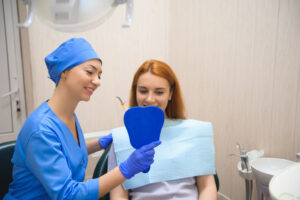
Oral Hygiene
 While regular visits to the dentist are important, nothing will help keep your smile healthy like a good at-home oral hygiene routine. Thorough at-home dental care, including brushing and flossing, will help to keep your teeth and gums healthy. Also, it will greatly reduce the likelihood of developing tooth decay and gum disease. At Advanced Dental and Implant Care we strive to educate our patients on the best oral hygiene practices.
While regular visits to the dentist are important, nothing will help keep your smile healthy like a good at-home oral hygiene routine. Thorough at-home dental care, including brushing and flossing, will help to keep your teeth and gums healthy. Also, it will greatly reduce the likelihood of developing tooth decay and gum disease. At Advanced Dental and Implant Care we strive to educate our patients on the best oral hygiene practices.
Brushing for Oral Health
Oral health begins with clean teeth. In addition, keeping the area where your teeth meet your gums clean can prevent gum disease. Furthermore, keeping your tooth surfaces clean can help you prevent tooth decay. Follow these brushing instructions:
- Brush your teeth at least twice a day. When you brush, don’t rush. Take time to do a thorough job.
- Use the proper equipment. Use toothpaste recommended by our Hygienist specifically for you and a soft-bristled toothbrush that fits your mouth comfortably. Also, consider using an electric or battery-operated toothbrush. In fact, these devices are helpful if you have arthritis or any reason that make it difficult to brush effectively with a manual toothbrush.
- Practice good technique. Hold your toothbrush at a slight angle — aiming the bristles toward the area where your tooth meets your gum; you should feel the bristles working. Gently brush with short back-and-forth motions. Remember to brush the outside, inside and chewing surfaces of your teeth, as well as your tongue.
- Keep your equipment clean. Always rinse your toothbrush with water after brushing. Store your toothbrush in an upright position and allow it to air-dry until using it again. Try to keep it separate from other toothbrushes in the same holder to prevent cross-contamination. Don’t routinely cover toothbrushes or store them in closed containers, which can encourage the growth of bacteria, mold and yeast.
- Know when to replace your toothbrush. Invest in a new toothbrush or a replacement head for your electric or battery-operated toothbrush every three to four months — or sooner if the bristles become irregular or frayed.
Flossing for Oral Health
You can’t reach the tight spaces between your teeth and under the gum line with a toothbrush. That’s why daily flossing is important. When you floss:
- Don’t skimp. Break off about 18 inches (46 centimeters) of dental floss, or use a floss pick. Wind most of the floss around the middle finger on one hand, and the rest around the middle finger on the other hand. Grip the floss tightly between your thumbs and forefingers.
- Be gentle. Guide the floss between your teeth using a rubbing motion. Don’t snap the floss into your gums. When the floss reaches your gum line, curve it against one tooth in a C shape.
- Take it one tooth at a time. Slide the floss into the space between your gum and tooth. Use the floss to gently rub the side of the tooth in an up-and-down motion. Unwind fresh floss as you progress to the rest of your teeth.
- Keep it up. If you find it hard to handle floss, use an Interdental cleaner — such as a dental pick, pre-threaded flosser or floss pick, tiny brushes that reach between teeth, a water flosser or silicone plaque remover.
As long as you do a thorough job it doesn’t matter if you brush or floss first.
Cleaning and Maintaining your Dental Implants or Hybrid Bridge
Most Implant supported teeth are non-removable. This creates different challenges when it comes to cleaning your teeth. Since it is not removable, it must be cleaned in a special way.
- Use Super floss. Use the strong, straight end to work the Super floss through and underneath, then floss in-between the implants.
- Use a Hydro floss or Waterpik. Place the nozzle at the junction between the gum tissue and the prosthesis. Spray water from the cheek side and the tongue side.
- Brush the prosthesis. Use a toothbrush without any toothpaste. Toothpaste can scratch the material that the prosthetic hybrid bridge is made of.
- Wear your Night Guard. Over time tooth structure can dwindle down. A Night Guard helps keep your teeth separated during the night time. This will help lower the wear and tear on your implant supported teeth or bridge.
To learn more about caring for your dental implants, visit our blog.
Contact Us For Your Oral Hygiene Appointment
When you visit Dr. Pottorff and his team, we will review your at-home oral hygiene routine. In addition, we will offer needed information on any additional steps you can take to further improve your oral health. For further questions, contact our team at (847) 854-1200 and we will schedule your hygiene appointment today!